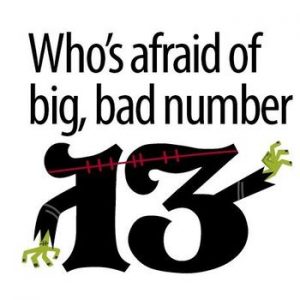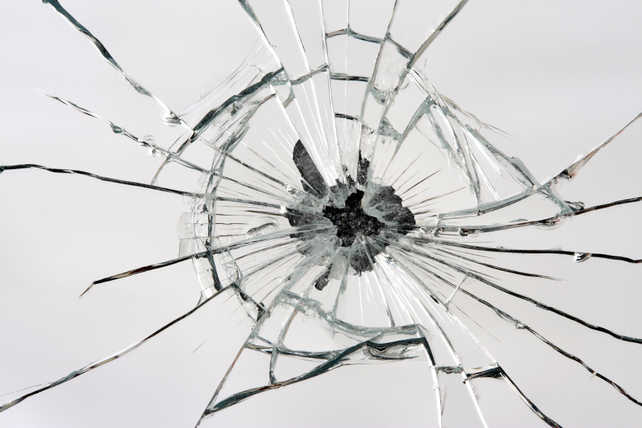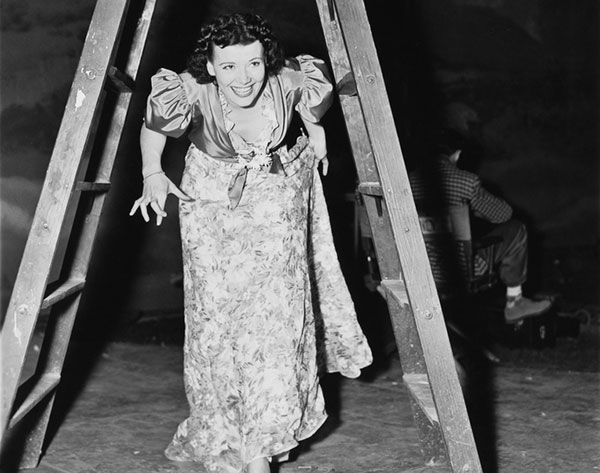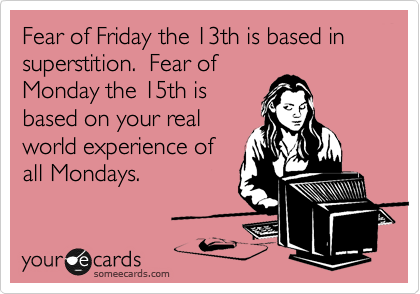Whether you are unmoved or shaking in your boots at the thought of Friday the 13th, we're bringing you the most well-known superstitions- where they came from and whether or not you should actually be worrying about them.
 The Number 13 (Triskaidekaphobia)
According to Numerology, 12 is the perfect number- which naturally makes 13 its imperfect sibling. Though the origins of this accursed tradition are uncertain, many believe that they ultimately begin with biblical references. Judas, the infamous betrayer of Jesus, was the 13th to sit at the Last Supper (which may have actually taken place on the 13th!). Additionally, Vincent Foster Hopper mentions that 16th century numerologist, Petrus Bungus, states that "the Jews murmured 13 times against God in the exodus from Egypt, that the thirteenth psalm concerns wickedness and corruption, that the circumcision of Israel occurred in the thirteenth year" in his work Medieval Number Symbolism: Its Sources, Meaning, and Influence on Thought and Expression.
The Number 13 (Triskaidekaphobia)
According to Numerology, 12 is the perfect number- which naturally makes 13 its imperfect sibling. Though the origins of this accursed tradition are uncertain, many believe that they ultimately begin with biblical references. Judas, the infamous betrayer of Jesus, was the 13th to sit at the Last Supper (which may have actually taken place on the 13th!). Additionally, Vincent Foster Hopper mentions that 16th century numerologist, Petrus Bungus, states that "the Jews murmured 13 times against God in the exodus from Egypt, that the thirteenth psalm concerns wickedness and corruption, that the circumcision of Israel occurred in the thirteenth year" in his work Medieval Number Symbolism: Its Sources, Meaning, and Influence on Thought and Expression.
 The Black Cat (Ailurophobia)
Though black cats are seen as good omens in various cultures, in Scottish folklore a black cat visiting your home is a sign of future prosperity, in Western culture these felines oft get a bad rap. Associated with witches and witchcraft, black cats were often believed to be a witch taking on another form as a form of spying and trickery. And then it gets complicated: in German lore if a cat crosses from right to left it's bad luck, but left to right is good luck; in parts of the UK a cat walking towards you brings good luck, but walking away takes the good luck away.
The Black Cat (Ailurophobia)
Though black cats are seen as good omens in various cultures, in Scottish folklore a black cat visiting your home is a sign of future prosperity, in Western culture these felines oft get a bad rap. Associated with witches and witchcraft, black cats were often believed to be a witch taking on another form as a form of spying and trickery. And then it gets complicated: in German lore if a cat crosses from right to left it's bad luck, but left to right is good luck; in parts of the UK a cat walking towards you brings good luck, but walking away takes the good luck away.
 The Broken Mirror (Spectrophobia)
I think we can all relate to the fear of the mirror sometimes (or the unexpected front-facing camera, eek!), but this phobia is taking it to a whole other level. The history of this fear, specifically the well-known fear of the "seven years bad luck" tradition, stems from the Romans and their belief in the closeness between the self and the reflection. They believed that life renewed every seven years and by breaking a mirror you would be interrupting this process and damaging the soul reflected.
The Broken Mirror (Spectrophobia)
I think we can all relate to the fear of the mirror sometimes (or the unexpected front-facing camera, eek!), but this phobia is taking it to a whole other level. The history of this fear, specifically the well-known fear of the "seven years bad luck" tradition, stems from the Romans and their belief in the closeness between the self and the reflection. They believed that life renewed every seven years and by breaking a mirror you would be interrupting this process and damaging the soul reflected.
 The Ladder (Stepnophobia)
Climbing a ladder is usually seen as a good thing, but it is generally agreed that walking under it is not. And why is that? Well, it turns out that ancient Egyptian priests would place a ladder against the wall in a pharaoh's tomb for when his spirit would want to climb upwards in the afterlife, but would capture both good and bad spirits in this triangular formation (leaning a ladder against a wall creates a right-angle triangle in the negative space). Negative space indeed, as it it also associated with the gallows, hangings, and one's demise.
The Ladder (Stepnophobia)
Climbing a ladder is usually seen as a good thing, but it is generally agreed that walking under it is not. And why is that? Well, it turns out that ancient Egyptian priests would place a ladder against the wall in a pharaoh's tomb for when his spirit would want to climb upwards in the afterlife, but would capture both good and bad spirits in this triangular formation (leaning a ladder against a wall creates a right-angle triangle in the negative space). Negative space indeed, as it it also associated with the gallows, hangings, and one's demise.
 Whether your solution is to hide under the covers or act like it's just another day, we can all agree that there's at least one good thing about the day- the TGIF factor. Happy weekend!
By ROWAN DALKIN
Whether your solution is to hide under the covers or act like it's just another day, we can all agree that there's at least one good thing about the day- the TGIF factor. Happy weekend!
By ROWAN DALKIN
 The Number 13 (Triskaidekaphobia)
According to Numerology, 12 is the perfect number- which naturally makes 13 its imperfect sibling. Though the origins of this accursed tradition are uncertain, many believe that they ultimately begin with biblical references. Judas, the infamous betrayer of Jesus, was the 13th to sit at the Last Supper (which may have actually taken place on the 13th!). Additionally, Vincent Foster Hopper mentions that 16th century numerologist, Petrus Bungus, states that "the Jews murmured 13 times against God in the exodus from Egypt, that the thirteenth psalm concerns wickedness and corruption, that the circumcision of Israel occurred in the thirteenth year" in his work Medieval Number Symbolism: Its Sources, Meaning, and Influence on Thought and Expression.
The Number 13 (Triskaidekaphobia)
According to Numerology, 12 is the perfect number- which naturally makes 13 its imperfect sibling. Though the origins of this accursed tradition are uncertain, many believe that they ultimately begin with biblical references. Judas, the infamous betrayer of Jesus, was the 13th to sit at the Last Supper (which may have actually taken place on the 13th!). Additionally, Vincent Foster Hopper mentions that 16th century numerologist, Petrus Bungus, states that "the Jews murmured 13 times against God in the exodus from Egypt, that the thirteenth psalm concerns wickedness and corruption, that the circumcision of Israel occurred in the thirteenth year" in his work Medieval Number Symbolism: Its Sources, Meaning, and Influence on Thought and Expression.
 The Black Cat (Ailurophobia)
Though black cats are seen as good omens in various cultures, in Scottish folklore a black cat visiting your home is a sign of future prosperity, in Western culture these felines oft get a bad rap. Associated with witches and witchcraft, black cats were often believed to be a witch taking on another form as a form of spying and trickery. And then it gets complicated: in German lore if a cat crosses from right to left it's bad luck, but left to right is good luck; in parts of the UK a cat walking towards you brings good luck, but walking away takes the good luck away.
The Black Cat (Ailurophobia)
Though black cats are seen as good omens in various cultures, in Scottish folklore a black cat visiting your home is a sign of future prosperity, in Western culture these felines oft get a bad rap. Associated with witches and witchcraft, black cats were often believed to be a witch taking on another form as a form of spying and trickery. And then it gets complicated: in German lore if a cat crosses from right to left it's bad luck, but left to right is good luck; in parts of the UK a cat walking towards you brings good luck, but walking away takes the good luck away.
 The Broken Mirror (Spectrophobia)
I think we can all relate to the fear of the mirror sometimes (or the unexpected front-facing camera, eek!), but this phobia is taking it to a whole other level. The history of this fear, specifically the well-known fear of the "seven years bad luck" tradition, stems from the Romans and their belief in the closeness between the self and the reflection. They believed that life renewed every seven years and by breaking a mirror you would be interrupting this process and damaging the soul reflected.
The Broken Mirror (Spectrophobia)
I think we can all relate to the fear of the mirror sometimes (or the unexpected front-facing camera, eek!), but this phobia is taking it to a whole other level. The history of this fear, specifically the well-known fear of the "seven years bad luck" tradition, stems from the Romans and their belief in the closeness between the self and the reflection. They believed that life renewed every seven years and by breaking a mirror you would be interrupting this process and damaging the soul reflected.
 The Ladder (Stepnophobia)
Climbing a ladder is usually seen as a good thing, but it is generally agreed that walking under it is not. And why is that? Well, it turns out that ancient Egyptian priests would place a ladder against the wall in a pharaoh's tomb for when his spirit would want to climb upwards in the afterlife, but would capture both good and bad spirits in this triangular formation (leaning a ladder against a wall creates a right-angle triangle in the negative space). Negative space indeed, as it it also associated with the gallows, hangings, and one's demise.
The Ladder (Stepnophobia)
Climbing a ladder is usually seen as a good thing, but it is generally agreed that walking under it is not. And why is that? Well, it turns out that ancient Egyptian priests would place a ladder against the wall in a pharaoh's tomb for when his spirit would want to climb upwards in the afterlife, but would capture both good and bad spirits in this triangular formation (leaning a ladder against a wall creates a right-angle triangle in the negative space). Negative space indeed, as it it also associated with the gallows, hangings, and one's demise.
 Whether your solution is to hide under the covers or act like it's just another day, we can all agree that there's at least one good thing about the day- the TGIF factor. Happy weekend!
By ROWAN DALKIN
Whether your solution is to hide under the covers or act like it's just another day, we can all agree that there's at least one good thing about the day- the TGIF factor. Happy weekend!
By ROWAN DALKIN







Comments are off this post!